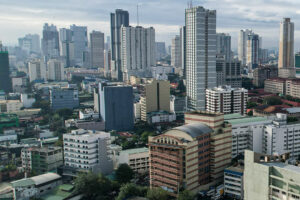Trump policies pose risks for PHL economy
THE PHILIPPINE ECONOMY may face pressure amid President Donald J. Trump’s policies, which could impact the currency, inflation and remittances, Fitch Ratings said.

By Luisa Maria Jacinta C. Jocson, Reporter
THE PHILIPPINE ECONOMY may face pressure amid President Donald J. Trump’s policies, which could impact the currency, inflation and remittances, Fitch Ratings said.
“Shifting economic and foreign policies in the US pose risks for the Philippines, as well as for other sovereigns,” Krisjanis Krustins, director at Fitch Ratings’ Asia-Pacific Sovereigns team and primary sovereign rating analyst for the Philippines, said in a report.
Mr. Trump began making good on his threat to impose higher import tariffs on major trading partners. A 10% tariff on all Chinese imports to the US took effect on Tuesday, but steep tariffs on imports from China and Mexico were postponed.
“Further strengthening of the US dollar from trade protectionism could put further pressure on the Philippine peso and inflation, although weaker global growth and diversion of Chinese exports could offset this to some extent,” Mr. Krustins said.
The peso has been under pressure in the past months amid the dollar surge. It fell to a record-low P59 level thrice last year.
The central bank expects inflation to average 3.3% this year and 3.5% in 2026 but warned the balance of risks to the inflation outlook remains tilted to the upside.
“The Philippines would be vulnerable to a change in US immigration policy, given the importance of remittances for domestic consumption, although these are fairly diversified,” Mr. Krustins said.
The United States typically accounts for about 40% of cash remittances to the Philippines.
Apart from tariffs, Mr. Trump also sought to impose harsher immigration measures.
Mr. Trump, a Republican, has taken an array of executive actions to deter illegal immigration, and ramping up arrests and deportations of illegal migrants, Reuters reported.
‘STRONG GROWTH’
Meanwhile, Fitch expects the country to post “strong medium-term gross domestic product (GDP) growth and gradual fiscal consolidation.”
The credit rater sees the economy growing by 5.9% this year, slightly below the government’s 6-8% target. It expects GDP to expand by 6.2% in 2026.
Growth next year will be driven by further monetary easing, infrastructure spending and trade and investment reforms, it said.
Latest data from local statistics agency showed Philippine GDP grew by a slower-than-expected 5.2% in the fourth quarter. This brought full-year growth to 5.6%, short of the 6-6.5% government goal.
“As noted in June, positive rating action would hinge on even faster growth and debt reduction, or structural improvements, such as stronger governance and GDP per head,” Mr. Krustins said.
“Nevertheless, domestic and external uncertainties have risen, with risks skewed towards slower consolidation,” he added.
The National Government’s budget deficit widened by 5.92% to P1.18 trillion in the first 11 months of 2024, the Treasury reported. The government has set a deficit ceiling at 5.7% of GDP for 2024 and targets to bring this to 3.7% by 2028.
“A focus on growth, as well as the approach of midterm elections in May 2025 will limit the scope for faster debt reduction,” Mr. Krustins said.
“The government already pared its consolidation plans in 2024, and the Finance secretary has ruled out new taxes possibly until the end of the Marcos administration in 2028.”
Fitch also cited domestic political tensions, which could “weigh on economic and fiscal performance.”
“Fierce public disagreements have erupted between President Ferdinand R. Marcos, Jr. and Vice-President Sara Duterte-Carpio and their families,” it added.


















